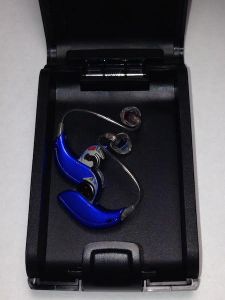[ad_1]
Contributed by Debbie Clason, staff writer, Healthy Hearing
What do people who wear hearing aids really think of their instruments and the process of purchasing them? Consumer Reports followed 12 people as they shopped for and used hearing aids, conducted a national survey of 110 people who had purchased hearing aids within the last three years and lab-tested 44 hearing aids. The article identified a lot of challenges preventing many people who would benefit from wearing a pair of hearing aids from making an appointment with a hearing healthcare practitioner.
Their findings were published in a 2009 issue on hearing health. Here’s what they found — along with a few updates since the article was published.

of time for individuals to make
the purchase, quality of life is
better with hearing aids!
Major challenges
Respondents to the Consumer Reports survey said they spent between $1,800 and $6,800 for a pair of hearing aids in the New York City metro area. This included the professional fitting and follow-up services.
Update: Hearing aids are still expensive; however, what you pay is determined by the variety of hearing aid manufacturers your hearing healthcare provider supports as well as the severity of your hearing loss. Prices range from $250 to almost $7,000. Those with mild to moderate hearing loss may be able to wear less expensive instruments than those with severe hearing loss.
Regardless, cost should not prevent you from seeking treatment for hearing loss. If you find you cannot afford the price of the instruments your hearing healthcare professional recommends:
- Ask the hearing center if they have a payment plan or support a private foundation which may be able to pay for some or all of the cost;
- Call your local United Way office and ask if there are organizations in town which provide financial support;
- Contact your local Kiwanis, Rotary or Lion’s Club. Many of these organizations have hearing aid refurbishing programs.
- If you are a veteran, contact the Veteran’s Administration. You may qualify to receive your hearing instruments free of charge.
- If you are still working or are a student, contact the Vocational Rehabilitation program in your state. You may qualify for free or reduced cost hearing aids.
Incorrect fit
The Consumer Report study found two-thirds of the 48 hearing aids tested by audiologists in the laboratory were not tuned properly for the hearing needs of the hearing aid wearer. Consumer Reports recommends choosing a good hearing healthcare professional in order to have a successful experience with hearing aids.
Here are some suggestions for finding a good provider:
- Ask your family and friends who wear hearing aids for a referral. If they are happy with a hearing healthcare professional, you may be, too.
- Ask your family physician for a referral.
- If the first two options don’t net you results, look for a trusted hearing center in your community on the Healthy Hearing website by entering your city, state, or ZIP. Read the verified patient reviews and choose which one is right for you.
Once you identify a potential professional, ask questions. Consumer Reports recommends:
- Verifying location and hours of operation so you can determine if that is convenient for you;
- Asking if the professional has walk-in hours or if you can only be seen by appointment;
- Asking if the professional hosts a hearing-rehabilitation group or support services once you purchase hearing aids
Lack of information
One-fourth of the 1100 hearing aid wearers in the Consumer Reports study said they didn’t know whether their hearing aids came with automated feedback suppression and a third didn’t know if their hearing aids had directional microphones — both of which are features that have become standard in even the most basic hearing aids.
Here are a few tips for making sure you get the most from your hearing devices:
- Get a thorough hearing evaluation. According to the Consumer Reports article “A hearing aid provider is only as good as her evaluation — how she determines your hearing loss and verifies that the prescribed aids work.”
- Only purchase hearing instruments from a licensed professional and not from the Internet. Only a hearing healthcare professional can determine the type and severity of your hearing loss and recommend the appropriate hearing instrument for your individual diagnosis.
- Understand the product you purchase by reading all of the materials provided to you by the hearing professional, which includes manufacturer brochures and user guides. If you don’t understand a particular feature, be sure to ask at your next appointment. The better you understand your hearing aids, the better you will be able to utilize its many features.
- Give your hearing aids a chance to work. You will most likely have a 30 to 90 day transition phase before your brain adapts to wearing hearing aids, depending on the severity of your hearing loss. During that time, be sure to work closely with your hearing healthcare professional. Be honest about your listening experience so they can tweak your instruments to maximize your hearing benefit.
Update: Most of the hearing healthcare professionals we’ve interviewed are passionate about providing quality hearing healthcare for their patients, which include complete information regarding the capabilities of the hearing instruments they prescribe; however, make sure you ask appropriate questions. For a list of what to ask, read 10 questions to ask your hearing healthcare professional before your first hearing evaluation.
The bottom line
Despite some of the negative findings, Consumer Reports found nearly 73 percent of their respondents are “highly satisfied with their aids.” These findings support other research which have shown that hearing aids improve quality of life and communication for those with hearing loss.
Ready to hear better and improve your quality of life? Check out the extensive directory on Healthy Hearing and find a hearing care professional in your area!
[ad_2]
Source link

